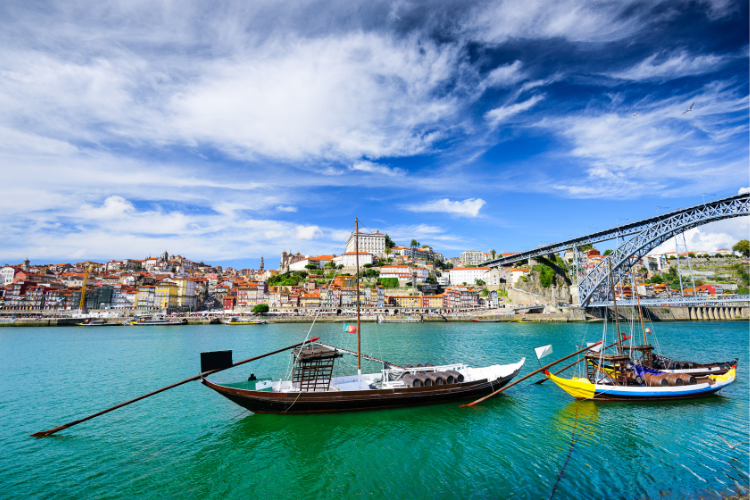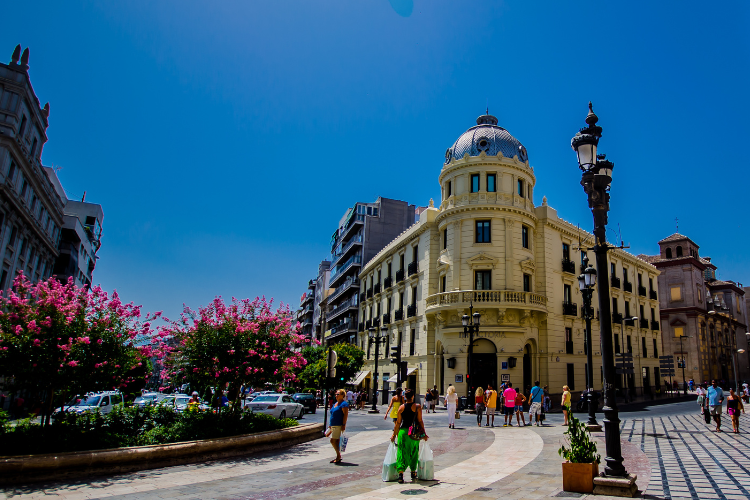Popular for all the right reasons, Portugal and Spain are still at the top of the list when you search for the best countries to live with passive income. But is making a comparison even fair? Are they equal in terms of visa requirements and rights? There’s a lot to compare between the Portugal D7 Visa vs Spain Non-Lucrative Visa, and we’re here to break it down.

We’ve created dedicated articles for each of the two visas, covering everything from required documents to rights and costs. Still, a side-by-side comparison often makes things clearer for expats trying to decide between them.
Keep reading to learn about the income requirements to apply, the documents needed, and the life you can expect to live in each country. We promise that by the time you reach the end of the article, you’ll know exactly which visa to apply for. Happy reading!
What is the Portugal D7 Visa?
Famously known as the Passive Income Visa, the Portugal D7 Visa is primarily used as a Retirement Visa. It is open to all non-EU residents who wish to live in Portugal with a passive income source.
Portugal has become a favorite retirement destination, offering an excellent quality of life for under €2,000 a month. Ranked as the 7th safest country in the world by the Global Peace Index, it combines safety with rich culture and a warm, welcoming community. And here’s the best part, all legal residents can apply for Portuguese citizenship after just five years of living there!
While it may be a small country, it is home to over 1 million expats who have left their old lives searching for a better one.
The Portugal D7 Visa is your ticket to a life of freedom, calmness, and new experiences. This visa is popular among retirees thanks to the low-income requirements and the long list of rights it grants the visa holder.
- Complete Guide: D7 Visa: All About The Portugal Passive Income Visa.
What is the Spain Non-Lucrative Visa?
Much like Portugal’s D7 Visa, Spain’s Non-Lucrative Visa also serves as a retirement option. It’s available to non-EU residents who want to live in Spain while relying on a passive income source.
However, there are a few significant differences between the Portugal D7 Visa and the Spain Non-Lucrative Visa. We’ll discuss the eligibility requirements in more detail shortly.
Spain is another extremely popular retirement destination, thanks to the calm coastal towns and welcoming expat community. It’s the 25th safest country in the world and one of the very few European countries that still allows real estate investments for the Golden Visa.
The timeline to qualify for Spanish citizenship is a little higher than in Portugal. Residents are eligible to apply for citizenship after 10 years of living in Spain. Regardless, many expats still opt for this.
The Spain Non-Lucrative Visa lets you live and retire in Spain without the need to work for income. Your financial support must come entirely from passive income sources. Let’s break down the details to give you a clearer picture.
Comparing Eligibility Requirements
This is where things get a little tricky. You must understand the eligibility requirements and required documents to understand exactly which visa you qualify for.
And in some cases, even if you qualify for both (on paper), you might still have a preference for the other.
Even with their clear differences, choosing between Portugal and Spain isn’t easy. Both countries are beloved by thousands of retirees, many of whom relocate from the US, UK, Canada, and even Asia to finally enjoy the lifestyle they’ve long dreamed of.
Portugal D7 Visa Requirements
First and foremost, what sources of income come under the category of “passive income” for Portugal?
Here’s a list:
- Pension – Retirement or disability pensions;
- Rental Income – Earnings from leased properties you own;
- Investment Income – Dividends, interest from savings or bonds;
- Royalties – Payments from intellectual property.
As of 2025, the main applicant must have a passive income of at least €10,500 annually (around €875 per month).
For a spouse or partner, considered a dependent, the main applicant must demonstrate an additional 50% in funds, which amounts to €5,244 per year (around €437 per month).
Additionally, for any children included in the Portugal D7 Visa application, the main applicant must show another 30%, amounting to €3,144 annually (roughly €262 per month).
Other than that, you will need the following documents:
- Proof of Accommodation;
- Health Insurance;
- Criminal Background Check;
- Valid Passport;
- Additional Documentation For Support.
You must present these documents at the appointment with the embassy.

Spain Non-Lucrative Visa Requirements
Similar to Portugal, the sources of income that qualify for Spain’s Non-Lucrative Visa are:
- Pension;
- Rental Income;
- Savings or Interest Income;
- Investment Income;
- Royalties.
The most important distinction between the Portugal D7 Visa vs Spain Non-Lucrative Visa is that you are not allowed to work in Spain with the Non-Lucrative Visa. However, you may work in Portugal on the D7 Visa.
This visa is designed for individuals who can sustain themselves financially without working or conducting business in Spain. However, after the first year, you may have the option to switch to a Work Visa. To better understand your situation, it’s always wise to discuss your concerns with knowledgeable immigration experts who can provide proper guidance.
Moving onto the income requirements for Spain’s Non-Lucrative Visa. The main applicant must show proof of income worth 400% of the IPREM (Indicador Público de Renta de Efectos Múltiples). This amounts to €2,400/month (€28,800 annually), per the official government site.
In addition, the amount for any dependents should be 100% of the IPREM, which is €600/month (€7,200 annually).
The documents remain the same overall. But here’s a general list:
- Health Insurance;
- Criminal Background Check;
- Valid Passport;
- Additional Documentation For Support.
Unlike in Portugal, proof of accommodation isn’t required to qualify for the Non-Lucrative Visa. This can be a big advantage if you haven’t secured a rental before beginning the application process.
How to Apply for the Portugal D7 Visa
First things first – start the process early.
Once you’ve decided you’re ready to make the big move, it’s best to get in touch with a relocation expert to guide you on the path you should follow. It’s not mandatory, but it helps you save time, effort, and money you could lose by making mistakes.
It’s best to begin the process at least 4 to 6 months before your planned move. Securing an appointment with AIMA can be quite challenging because of the high demand.
During your interview, be prepared to answer any questions about your move, your financial proof, and anything related. Then, you will pay the necessary fees and track your application status.
Let’s Move to Europe
With Viv Europe your plans for Europe will come to a reality
How to Apply for the Spain Non-Lucrative Visa
The availability of appointments at the Spanish consulate is generally much easier to secure compared to Portugal. It’s still advisable to start your process at least 4 to 6 months prior to your intended move.
Because of the high level of bureaucracy, handling the process on your own can feel overwhelming. Don’t get discouraged by the paperwork, trust your relocation experts to guide you and try to go with the flow along the way.
Once your appointment date arrives, submit your documents and discuss your plans to live in Spain with a Non-Lucrative Visa. The wait will be challenging but well worth it!
Residency Rights and Limitations
Take a look at the following rights and limitations for the Portugal D7 Visa vs Spain Non-Lucrative Visa.
| Type | Portugal D7 Visa | Spain Non-Lucrative Visa |
|---|---|---|
| Work Rights | Freelance and remote work for foreign employers is allowed. However, working for a Portuguese company requires applying for a work permit. | This visa does not allow employment within Spain. |
| Residency Duration | The initial visa is valid for 2 years, with a possible 3-year extension. | The initial visa is valid for 1 year, with a possible 2-year extension. |
| Family Members | Spouses and dependent children under 18 years, or up to 21 years if studying, are allowed. The main applicant must show proof of sufficient means. | Spouses and children can be included. The main applicant must show proof of sufficient means. |
| Travel Rights | Travel freely in the Schengen area for up to 90 days within 180 days. | Travel freely in the Schengen area for up to 90 days within 180 days. |
| Healthcare | D7 Visa holders must have health insurance covering their stay. Although you have access to free public healthcare. | Non-Lucrative Visa holders must have private health insurance covering their stay. |
Read Also: Remote Work Visa: Portugal vs. Spain Digital Nomad Visa
Life In Portugal As A Retiree
The serenity can be an incredibly magnetic force for expats. As the 7th safest country in the world, retirees feel at peace when walking down the street, traveling to another city, or enjoying Portugal’s landscapes without worry.
Time and time again, our clients have reached out to us saying they would like to live somewhere safe, and Portugal is at the top of their list.
Another reason why life in Portugal can feel so stress-free is thanks to the low cost of living. When you’ve worked so hard your entire life, it only makes sense to get the best out of your money. And with the same amount of money, retirees can enjoy a much higher quality of life.
The cost of living in the USA is nearly 39.8% higher than in Portugal (without rent). Rental prices are 63.7% higher as well. For retirees, this means that pensions or savings often stretch further.
Life In Spain As A Retiree
Spain is another dream destination for retirees, offering a wonderful mix of cultural richness, affordability, and natural beauty. The weather is pleasant all year-round, and many find Spanish relatively easy to learn.

The expat community has grown tenfold in the last decade, and retirees quickly find their new support system once they start socializing. Lowkey cities like Málaga and Alicante are relatively more preferred than busy cities like Barcelona and Madrid. But it all comes down to personal preferences.
Coming onto the cost of living, it is 24.6% lower than in the United States (without rent). And rental prices are also 43.4% lower in Spain.
Unfortunately, the Golden Visa which has been a great option for retirees in Spain was removed as of April 3, 2025. If you are still curious about the program, read more here.
- Read Also: Retire In Spain: Complete 2024 Guide.
Portugal D7 Visa vs Spain Non-Lucrative Visa: Which Visa is Right for You?
We hope this article gave you clarity on which visa suits your case and needs the best. If you’re still confused or have any detailed questions you’d like to be answered, get in touch with Viv Europe to learn more about each visa.
If neither of these two makes sense for you, there are plenty more options to choose from. And we’re here to help every step of the way.
To mingle with our expat community, join our Facebook Group – All About Portugal For Expats and All About Spain For Expats with a collective community of over 15,000 expats. See you soon!





